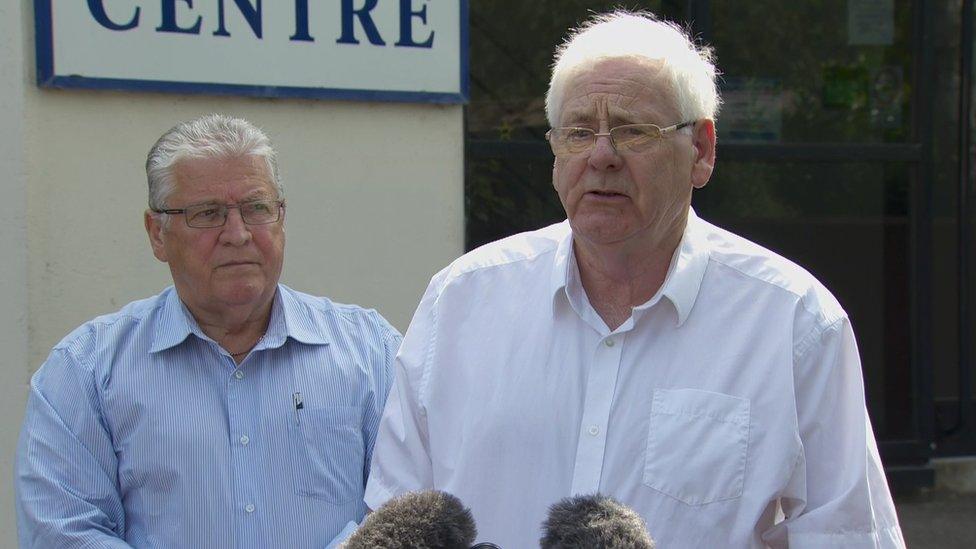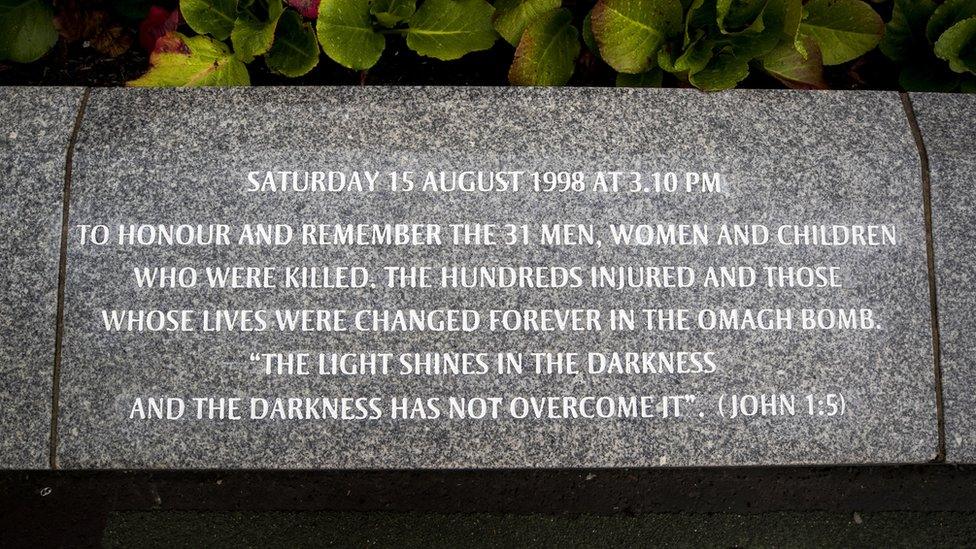'Real prospect Omagh bomb could have been prevented'
- Published

Twenty-nine people, including a woman pregnant with twins, were killed in the Real IRA attack
It is plausible that there was a real prospect the 1998 Omagh bombing could have been prevented by the security services, a judge has ruled.
Mr Justice Mark Horner also called for new investigations on both sides of the Irish border.
He made the ruling at Belfast High Court in a case brought by Michael Gallagher, whose son Aiden was one of the victims.
The 29 victims of the Real IRA attack included a woman pregnant with twins, external.
It was the biggest single atrocity in the history of the Troubles in Northern Ireland.
No one has ever been convicted of carrying out the attack.
The Omagh bombing: A timeline of events
In his ruling, the judge said: "I am satisfied that certain grounds when considered separately or together give rise to plausible allegations that there was a real prospect of preventing the Omagh bombing.
"These grounds involve, inter alia, the consideration of terrorist activity on both sides of the border by prominent dissident terrorist republicans leading up to the Omagh bomb."
He added: "It is not within my power to order any type of investigation to take place in the Republic of Ireland but there is a real advantage in an Article 2 compliant investigation proceeding in the Republic of Ireland simultaneously with one in Northern Ireland.
"Any investigation will have to look specifically at the issue of whether a more proactive campaign of disruption, especially if co-ordinated north and south of the border, had a real prospect of preventing the Omagh bombing, and whether, without the benefit of hindsight, the potential advantages of taking a much more aggressive approach towards the suspected terrorists outweighed the potential disadvantages inherent in such an approach."
The judge said he was "not going to order a public inquiry to look at the arguable grounds of preventability".
Public inquiry call
Responding to the verdict, Michael Gallagher said: "The court's conclusions today, almost 23 years after the Omagh bomb, vindicate the consistent view that there are significant issues that need to be appropriately investigated.
"The only mechanism that can bring about truth and justice is a full public inquiry."
Mr Gallagher told the media the judgement was "quite difficult to take in" due to the "enormity" of what the judge said.
"For a very long time there's been no doubt in my mind that Omagh was a preventable atrocity, but nobody wanted to hear that message, not the Irish government, not the British government, but now we have an independent person who has said it."

Stanley McCombe and Michael Gallagher, who lost loved ones in the bombing, respond to Friday's ruling


The conclusion of this long awaited ruling only runs to one page, but the fuller judgement will follow in due course.
Essentially Mr Justice Horner says two things: it is plausible the Omagh bomb could have been prevented and the allegations around pre-attack intelligence merit an investigation.
I think the government will find it very, very difficult to resist the ruling here.
That's not to say they may not challenge it and seek to overturn it.
There may be parallels with the Patrick Finucane case as they too have won court cases in which they have found there hasn't been an adequate investigation and the government has resisted or stalled on a public inquiry and an investigation in that case.
We may not see something happening very quickly.

Secretary of State Brandon Lewis said the families deserve answers and he had "great respect for their patience, grace and determination".
He added: "We recognise that today the court has set out that there are 'plausible allegations that there was a real prospect of preventing the Omagh bombing' and that more should be done to investigate this.
"The UK government will take time to consider the judge's statement and all its recommendations carefully as we wait for the full judgment to be published."
Taoiseach (Irish prime minister) Micheál Martin said that "evil people" carried out the 1998 attack which he described as "absolutely reckless, appalling and gave such heartache".
He said: "We're going to analyse the judgement and do what is necessary in terms of the citizens on the island of Ireland."
The legal case began in 2013 and concluded two years ago, but the judgement has only now been delivered.
The Lord chief justice's office blamed the delay on the assessment of "sensitive" documents.

RUC and forensic officers sift through the debris of the Omagh explosion
The legal action followed a decision by the government to reject the need for a public inquiry eight years ago.
It said there had been multiple investigations, including those involving the Police Ombudsman.
Central to Mr Gallagher's case were claims that intelligence from intelligence agents, MI5 and RUC officers could have been drawn together to prevent the bombing.
There were national security issues around the hearing of evidence, which delayed matters, but it concluded in July 2019.
Related topics
- Published4 March 2021

- Published28 January
